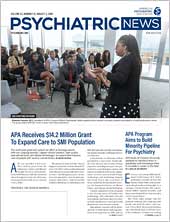Even as a very young child, psychiatrist Chad Lennon, M.D., had a profound curiosity in how the human mind works and a yearning to deeply understand people. As a teenager, having friends who experienced ADHD, bipolar disorder, and depression helped draw him toward a career in psychiatry.
But while other people take for granted working and studying with people who look like them, said Lennon, who is black, he encountered just one other black man in all four years of his residency. Lennon was among those who participated in a presentation for 50 black students from Howard University whom APA hosted at its headquarters in Washington, D.C., last month to encourage them to consider a career in psychiatry.
The group included incoming college freshmen who are taking part in Howard University’s Health Careers Opportunities Program (HCOP), which is aimed at creating a more diverse health care workforce. Blacks and Hispanics are underrepresented in medicine today: just 6 percent of U.S. physicians and surgeons are black or African American, and 6 percent are Hispanic, according to the Bureau of Labor Statistics. However, these groups comprise 13 percent and 18 percent of the U.S. population, respectively.
The HCOP targets economically or educationally disadvantaged students and helps prepare them for careers in health professions with summer academic enrichment activities for incoming college freshmen as well as science activities for students in grades K to 12. Also in attendance were Howard University upperclassmen from its Pre-Health Scholars Summer Enrichment Program, who receive weekly advising sessions and special workshops to help them prepare for applying to health professions schools.
Lennon advised the students to ultimately pursue employment in a place with racial and ethnic diversity and inclusion, as well as “a mechanism for addressing issues in a way that maintains safety.”
After the program, Lennon told Psychiatric News that he wants to “be a part of the students’ journey. It feels validating and it feels powerful to see someone who looks like you succeeding in the craft that you want to succeed in.”
Kimberly Gordon, M.D., vice chair of APA’s Council on Children, Adolescents, and Their Families, president of APA’s Caucus of Black Psychiatrists, and medical director of Hope Health Systems Inc., told the group that she remembers from her years growing up in the Bible Belt of Louisiana that if someone in her community had psychological problems, they were told “to just pray and it will go away.” She thought about becoming a registered nurse like her mother, but because of Gordon’s obvious aptitude, her mother encouraged her to become a physician. But having limited access to mentors who looked like her left her feeling isolated and even like an imposter as she studied her way through medical school and residency.
As a black woman psychiatrist, Gordon has dealt with racial microaggressions, including being questioned about whether she is “supposed to be in the room” when other doctors are meeting, she said. But some of that goes away “once people recognize you are a leader and can articulate patients’ needs.” Ultimately, she is proud of her work as a psychiatrist rehabilitating at-risk youth enmeshed in the juvenile justice system.
“I think psychiatrists are the real holistic doctors,” she told the group. “If a patient has a problem that can’t be solved by any other doctor, you consult with a psychiatrist. A psychiatrist understands the social conditions of a community and best appreciates the social determinants of health.”
Justice Crawford from Atlanta was one HCOP participant and incoming Howard freshman who aspires to become a psychiatrist one day. He was inspired after seeing that therapy helped a close friend work through his issues after he was suspended from school for getting into fights. Crawford’s father is a physician specializing in internal medicine.
HCOP participant Jayla Wade, who recently graduated from high school in Greensboro, N.C., is the oldest girl in her family and also intends to become a physician, most likely a surgeon, she said. She will be the first person in her family to graduate from a four-year college.
“I want to save lives and change medicine,” she told Psychiatric News. “I hope to continue to put myself in situations like this, to network and be inspired. To be in a building like this, so close to such inspiring people—it’s surreal.” ■



